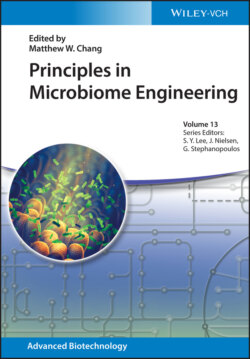Читать книгу Principles in Microbiome Engineering - Группа авторов - Страница 26
1.2.1.1 Protein and Polypeptides
ОглавлениеThe high nitrogenous content of dietary protein and peptides provides amino acids essential to both the host biochemistry and its microbiota. Most organisms require the essential 20 different amino acids to facilitate their cellular function [64]. The human host–microbiome favors the retention of certain microbiota population that helps break down protein complexes, providing the host with better absorption of these digested protein products. Some of these microbes thrive in the small intestine, such as Klebsiella spp., E. coli, Streptococcus spp., Succinivibrio dextrinosolvens, Mitsuokella spp., and Anaerovibrio lipolytica, which secretes various proteases and peptidases to facilitate protein digestion in the human gut [65].
High‐dietary protein can change the microbiota composition by favoring microbes that can metabolize exogenous proteins. Certain microbes from the genus Bacteroides and Lactobacillus johnsonii naturally secrete proteases to digest dietary proteins and facilitate microbial localization in the small intestine [66]. These microbes establish a form of commensalism with the host, where the digested amino acids are utilized both by the microbe and human host via absorption through the intestinal epithelial tissue. Microbiome dysbiosis caused by protein deficiency, such as a vegetarian diet, results in the depletion of protein‐metabolizing populations and triggering intestinal inflammation [67].
Beef‐based protein‐rich diet showed the lower abundance of Bifidobacterium adolescentis and enriched Bacteroides and Clostridia abundance, indicating that meat‐derived protein source can influence the development of the host microbiome [68]. The correlation of gut microbes to protein diet is summarized in Table 1.1.
Table 1.1 Effects of dietary protein on host‐gut microbiota.
| Microbial diversity | Bifido bacteria | Lacto bacilli | Bacter oides | Alist ipes | Bilo phila | Clost ridia | Rose buria | Eubacterium Rectale | References | |
|---|---|---|---|---|---|---|---|---|---|---|
| Animal protein | ↑ | ↑↓ | ↑↓ | ↑ | ↑ | ↑ | ↓ | ↑↓ | [54, 69, 70] | |
| Whey protein extract | ↑ | ↑ | ↑ | ↓ | [71, 72] | |||||
| Pea protein extract | ↑ | ↑ | ↑ | [73] |
Source: Singh et al. [68]/Springer Nature/CC BY 4.0.
